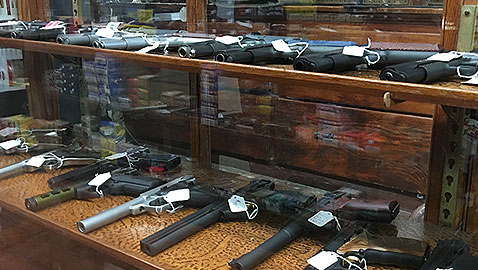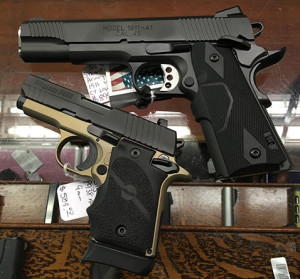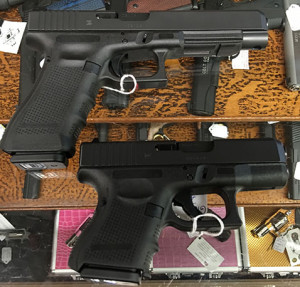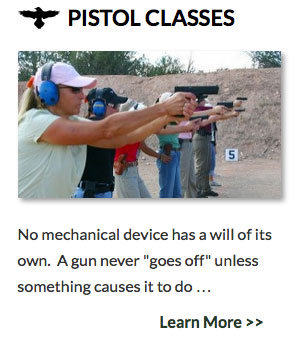Widgetized Section
Go to Admin » Appearance » Widgets » and move Gabfire Widget: Social into that MastheadOverlay zone
Critical Tip for Buying your First Handgun for Self-Defense
The answer to the most frequently-asked question is not what you might expect
 Which gun should I buy?
Which gun should I buy?
What is your recommendation?
Over the 30 plus years I have been involved in firearms training, competitive shooting and plain old good plinking time on the range. I wish I had written down all the answers that have been given to new gun owners. It would have been at least a 350-page book with different answers to the same question.
What many of these different answers have in common can be narrowed down to personal preferences and experiences and they’re all important elements to consider. As a potential new gun owner, you should listen to all of them. But before it comes down to the specific makes and models, there is one important thing to consider first.
The first answer to FAQ #1 is this: The best firearm for self defense is the one you’re most comfortable with and can manipulate and handle with confidence.
I know…. this answer is not what most people want to hear. We live in fast paced times and we all want to take shortcuts either to save time, money or both. So yes, I understand that this answer can sound somewhat vague. But here’s the truth: All gun owners will have to make a time investment way past a gun selection to reach a point where they will say: This “is” the gun I’m most comfortable with.
 My personal preference does not have to be yours! I’ve always been in favor of the 1911 with a manual safety. I can manipulate a 1911 in the dark. It’s the one I’ve trained with on the range and shot thousand of rounds with. I have a Sig P938 as one of my smaller carry guns because it has a 1911 functionality. All my training with a full size 1911 is to my advantage when I have to draw the compact Sig in a self defense situation.
My personal preference does not have to be yours! I’ve always been in favor of the 1911 with a manual safety. I can manipulate a 1911 in the dark. It’s the one I’ve trained with on the range and shot thousand of rounds with. I have a Sig P938 as one of my smaller carry guns because it has a 1911 functionality. All my training with a full size 1911 is to my advantage when I have to draw the compact Sig in a self defense situation.
Looking back, my initial choice and selection was not a scientific one. After weeks of trying different guns, it was simply the gun that I could afford at the time. I became familiar with it and with all its pros and cons. I could have easily become a fan of any specific brand or firearms system provided that I invested the time to be comfortable with my choice. And trust me, a lot of gun owners out there do not agree with me on my choice.
Why?
Because they chose a different path either by coincidence, budget or advise from fellow gun owners or the local gun store. Regardless, it’s their investment in becoming comfortable and familiar with their choice that counts! And because of that, their “choice” is as good as mine.
If you buy a handgun and don’t take the time to train and become sufficient with it, it doesn’t really matter what the answer is to your question on recommendation. No gun will ever be so good that you can skip the most important aspect, which is training and the maintenance of those skills you acquired.
A Training Gun And A Carry Gun
Let’s go back to the original question based on the fact that training is as important as your choice of firearm. Many first time gun buyers have proudly come home from the gun store with a compact pistol or revolver feeling that their choice was a good one. That feeling stayed there until they went to the shooting range. After a few rounds, most of them reacted the same way: “Ok, I’m done! My hand hurts!” That first experience is not a good starting point for any kind of training, which brings me to the second answer:
The Second Answer to FAQ #1: Choose a full sized gun as your first gun so you can comfortably acquire the skills needed to accurately shoot and manipulate that specific firearm system.
A compact or small pistol or revolver is built for easy concealment. They are lighter and because of that, the recoil is much “snappier” than that of a full sized or heavier handgun. Some of them are also very uncomfortable to shoot. They’re not “training devices”. Training with them does not necessarily make you a good shooter.
 In other words, your compact carry gun should be your gun buy #2, and the downsized version of your personal preference. If your budget allows it, buy both of them at the same time. Down the road, you’ll have to combine the training using both the full size gun and the compact version of it. Improving your gun handling skills and accuracy require more than a few rounds . Your “mass training” will be with your full size training gun and will be your foundation for better handling of your smaller carry gun.
In other words, your compact carry gun should be your gun buy #2, and the downsized version of your personal preference. If your budget allows it, buy both of them at the same time. Down the road, you’ll have to combine the training using both the full size gun and the compact version of it. Improving your gun handling skills and accuracy require more than a few rounds . Your “mass training” will be with your full size training gun and will be your foundation for better handling of your smaller carry gun.
Bottom line is, that the right choice of a firearm or firearms has many components to it and involves a lot more than what is covered in this article. My answer or answers to FAQ #1 is in my opinion… the important baseline in your decision making process. If this baseline is not in place, nothing else matters.
If you’re not willing to invest the time to become familiar with your choice and become a good marksman with it, your choice of a pistol or revolver will just represent a time period in your life where you simply considered a tool for self defense but did not properly follow through with it.



 MidwayUSA
MidwayUSA Ruger Firearms
Ruger Firearms SCCY Firearms
SCCY Firearms Streamlight
Streamlight Action Targets
Action Targets Gunsite Academy
Gunsite Academy
3 Responses to Critical Tip for Buying your First Handgun for Self-Defense
You must be logged in to post a comment Login